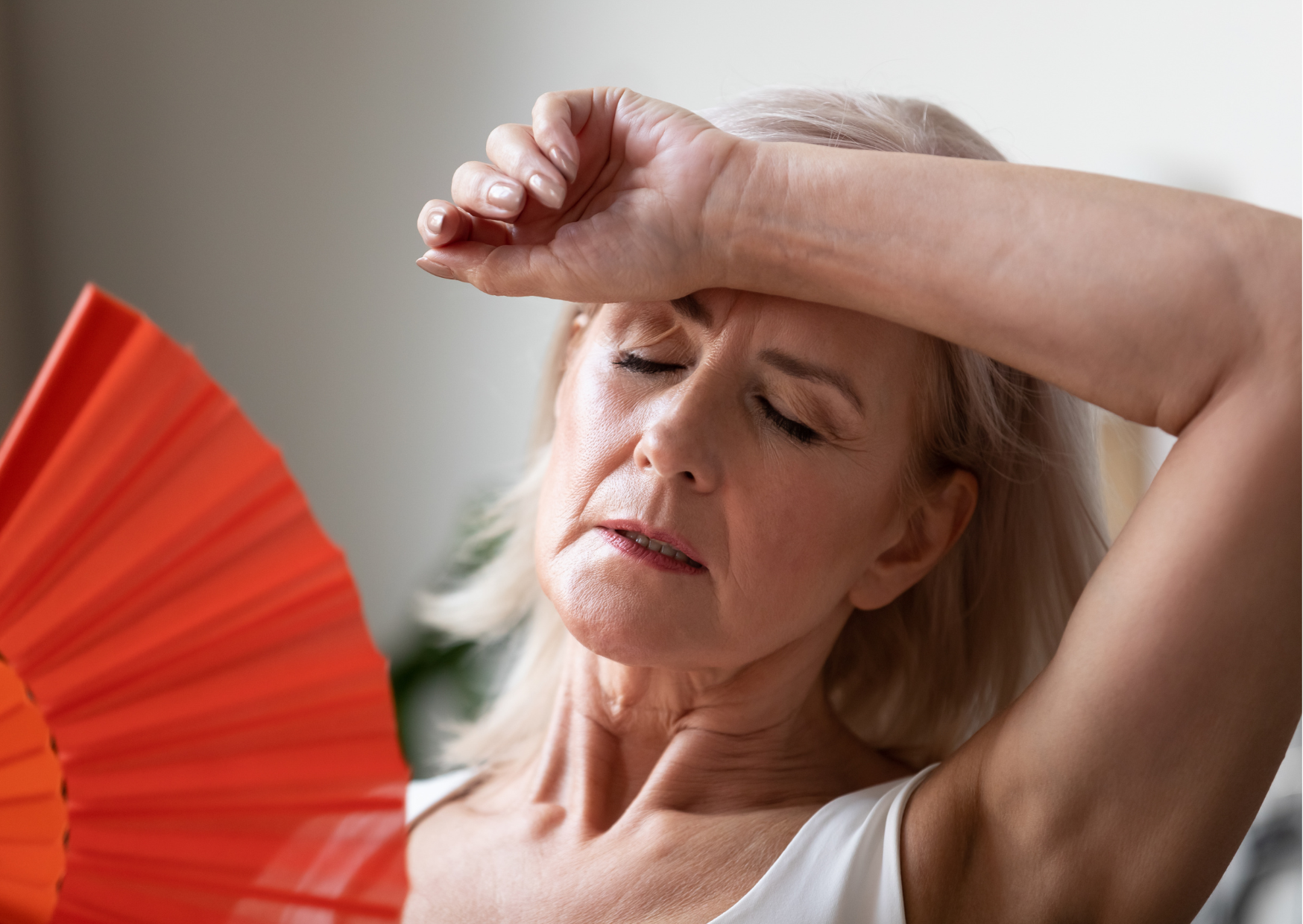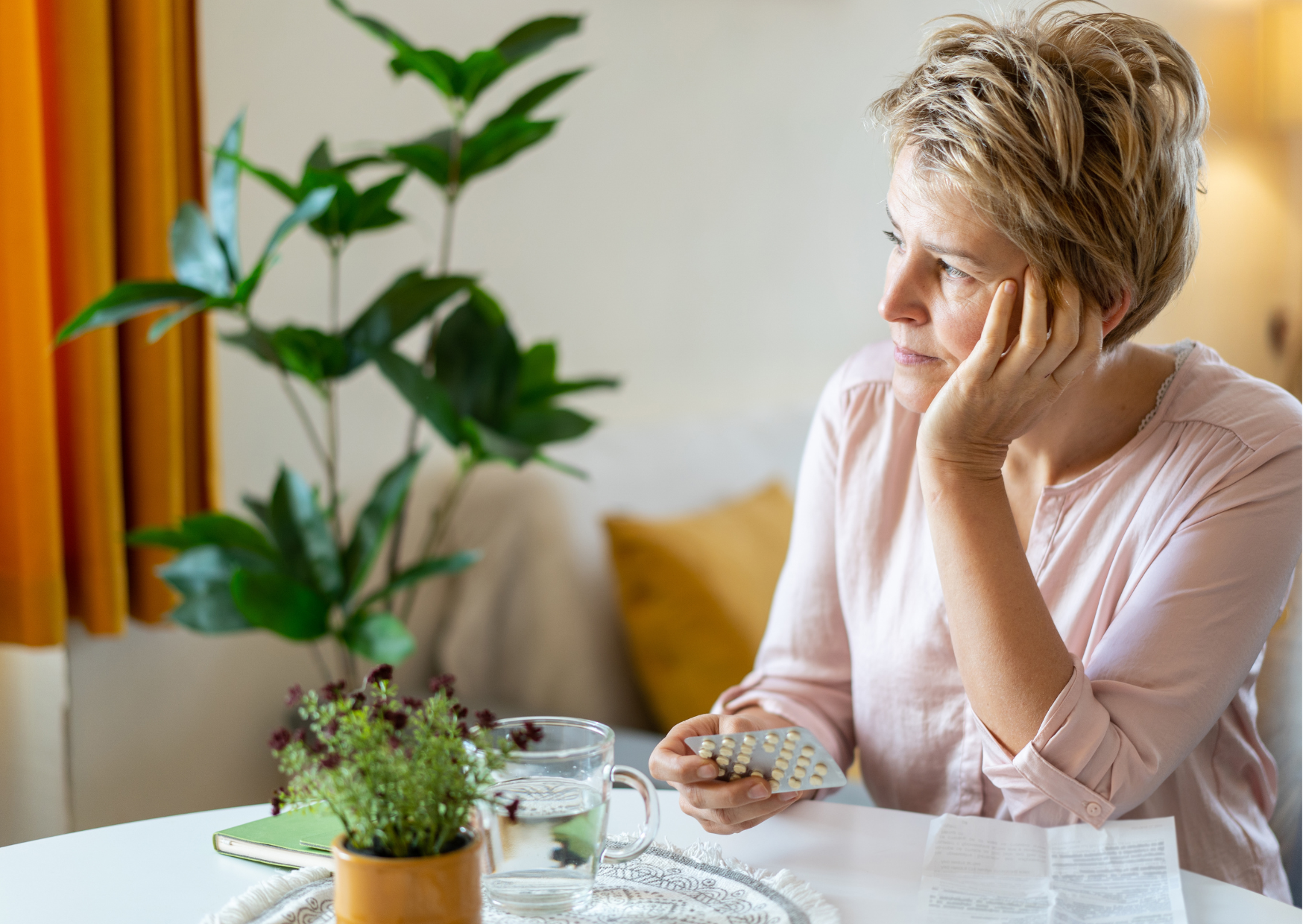Understanding the impact of Menopause
Menopause impact on mental health and other facets of your life can be enormous.
The average age for menopause is around 51 years old, but it can happen anytime between the ages of 40 and 58. The age range when women begin having menopausal symptoms and start transitioning into menopause is called perimenopause and usually starts around age 45-55.
Menopause occurs when a woman's ovaries stop producing the hormones estrogen and progesterone and she stops ovulating and having periods. It signals the end of fertility and a woman's reproductive years. After menopause, menstrual cycles are no longer necessary and periods stop completely.
The transition to menopause is a gradual process that can take anywhere from 2 to 8 years. It starts with changes in the length and frequency of menstrual cycles. Cycles may shorten or lengthen, become lighter or heavier, frequent, and become unpredictable. These irregular cycles are a sign that menopause is approaching.

Changes Leading up to Menopause
The transition to menopause, medically referred to as perimenopause, can begin years before menstruation stops. This time is marked by fluctuating hormones that lead to a variety of symptoms.
- Irregular periods - Periods may be shorter or longer in duration and the time between periods becomes irregular. Menstrual flow may be lighter or heavier as well.
- Hot flashes - Sudden feelings of heat in the upper body, particularly the face, neck and chest. Hot flashes can come and go quickly or linger for a while. Night sweats are hot flashes that occur during sleep.
- Sleep disturbances - The hormonal fluctuations of perimenopause can disrupt normal sleep patterns, making it difficult to fall asleep and stay asleep. Insomnia and night sweats contribute to sleep problems.
- Mood changes - Irritability, anxiety, sadness, and mood swings are common during the transition to menopause as estrogen levels decline.
- Vaginal dryness - Declining estrogen causes the tissues of the vagina to become thinner, drier, and less elastic. This can lead to discomfort during sexual intercourse.
- Urinary changes - Lower estrogen levels can weaken the urinary tract leading to an urgent need to urinate, accidental urinary leakage and increased urinary tract infections.
- Hair and skin changes - Estrogen helps keep hair and skin moisturized so hair may become drier and skin less elastic during perimenopause.
The duration and severity of perimenopause symptoms varies greatly among women. Understanding these changes helps women know what to expect as their bodies transition to menopause.
Physical Changes
The declining estrogen levels that occur during perimenopause and menopause can lead to several physical changes in a woman's body. Some of the most common physical changes include:
Hot Flashes and Night Sweats
- Hot flashes are sudden feelings of intense heat and sweating, usually in the upper body. They may last from 30 seconds to several minutes.
- Night sweats often occur with hot flashes and can disrupt sleep.
- Around 80% of women experience hot flashes and night sweats during menopause. Lifestyle changes like avoiding triggers, dressing in layers, and lowering room temperature can help manage symptoms.
Vaginal Dryness
- Declining estrogen levels can cause the tissues of the vagina to become thinner, drier, and less elastic. This can lead to discomfort, pain during sex, and increased risk of infection.
- Vaginal moisturizers and lubricants can help provide relief from dryness and discomfort. Estrogen creams or suppositories may also be prescribed.
Bone Loss
- Estrogen helps maintain bone strength. During menopause, bone loss accelerates and the risk of osteoporosis increases.
- Weight-bearing exercise, calcium, vitamin D, and sometimes medication can help prevent excessive bone loss. Getting bone density tests is recommended.
Weight Gain
- Hormonal changes can cause the body to shift to a higher percentage of body fat. Declining estrogen may influence where fat is distributed in the body.
- Staying active with cardio and strength training exercises can help manage weight. A healthy diet is also important.
Emotional Changes
The hormonal fluctuations that occur during perimenopause and menopause can cause a variety of emotional changes. Women may experience greater mood swings, anxiety, irritability, and depression.
Mood swings are common during this time due to the changes in estrogen and progesterone levels. Some days you may feel upbeat and energetic, while other days you may feel sad, irritated, or angry. These mood swings can sometimes feel like an emotional rollercoaster.
Many women also report increased anxiety and tension during menopause. The hormonal changes can disrupt sleep and cause physical symptoms like hot flashes and night sweats, which can create stress. Things that didn't bother you before may suddenly feel overwhelming.
Irritability levels tend to rise as well. You may feel less patient in general, and small annoyances seem magnified. Frustration tolerance decreases during this time.
Some women experience depression during perimenopause or menopause, although the link between depression and menopause is complex. It's unclear whether depression is directly caused by menopause or perhaps triggered by other factors like sleep disruption, stress, or the psychological impact of reproductive aging.
Regardless of the cause, depression should be taken seriously. Tell your doctor if you are experiencing profound sadness, loss of interest in normal activities, changes in appetite, inability to concentrate, or thoughts of suicide. Treatment with therapy or antidepressant medication may help manage depressive symptoms.
Remember, these emotional changes are normal and temporary. As your body adjusts to the new hormonal levels after menopause, your moods should stabilize again. Be patient and compassionate with yourself during this transition.
Cognitive Changes
One of the most common symptoms women report during menopause is forgetfulness and difficulty concentrating. Many women describe feeling like their memory and brain power diminishes during this time.
The exact reasons for these cognitive effects are still being researched, but studies have shown connections between the hormonal fluctuations of menopause and changes in memory, focus, and concentration. When estrogen levels decline, it can impact brain chemistry and function.
Some of the cognitive change’s women may experience include:
- Short-term memory lapses - Forgetting things like appointments, conversations, or where you put your keys
- Reduced focus and concentration - Trouble staying focused on tasks, getting easily distracted, wandering or fuzzy thoughts
- Word or name recall issues - Having a word "on the tip of your tongue" but unable to remember it
- Problems learning or retaining new information - Struggling to learn new skills or recall facts
- Multitasking challenges - Difficulty doing multiple things at the same time
- Taking longer to process information - Feeling like your brain is foggy or sluggish
The good news is these changes are often temporary and things tend to improve after menopause when hormones rebalance. There are also many strategies women can use to help boost their cognition during this transition:
- Getting enough sleep and managing stress
- Staying mentally active with puzzles or learning new skills
- Focusing on one task at a time instead of multitasking
- Using memory aids like lists, reminders, or alerts
- Exercising regularly to increase blood flow to the brain
- Eating a healthy diet with brain-boosting foods
- Practicing meditation, mindfulness, or relaxation techniques
Being patient and compassionate with yourself as you navigate this challenging period can go a long way. Know that you are not alone in experiencing these changes, and they do not mean your intellect is diminishing. With the right care and support, your mind will come back into focus in time.
Life Style Changes
The hormonal fluctuations of perimenopause and menopause can disrupt healthy lifestyle habits. Making positive changes to diet, exercise, and sleep can help manage symptoms.
Diet - Eat a balanced, nutritious diet focused on whole foods like vegetables, fruits, whole grains, legumes, nuts, seeds, and lean proteins. Avoid processed foods high in sugar, salt, and unhealthy fats, which can exacerbate mood swings and hot flashes. Some women find relief avoiding potential triggers like spicy foods, caffeine, and alcohol. Getting enough calcium and vitamin D helps maintain bone health.
Exercise - Regular exercise helps relieve stress, boost energy and mood, maintain heart health, and prevent weight gain. Aim for 30 minutes of moderate activity most days. Weight-bearing exercises like walking, jogging, dancing, and strength training are especially important to build and maintain bone density. Yoga and Pilates can aid flexibility and balance.
Sleep - Prioritize getting adequate, high-quality sleep to feel rested and restore hormonal balance. Stick to a regular sleep schedule, limit blue light exposure before bedtime, and create an optimal sleep environment that is cool, dark, and quiet. Stress management techniques and avoiding stimulants in the evening can also improve sleep.
Making healthy lifestyle changes goes a long way in effectively navigating menopause. Consult with a healthcare provider for guidance on the best diet, exercise plan, and sleep habits specifically for you.
Medical Treatments
Hormone therapy (HT), also known as hormone replacement therapy (HRT), is the most effective treatment for menopausal symptoms. It can help relieve hot flashes, night sweats, vaginal dryness, and problems sleeping. HT contains estrogen, and sometimes progesterone. It comes in pill, patch, cream, gel, spray, or implanted pellet form.
The main types of HT are:
- Estrogen therapy - estrogen only
- Combination estrogen-progestin therapy - estrogen plus progesterone
HT is very effective for treating moderate to severe hot flashes and night sweats. It also helps prevent bone loss and fracture. HT may also have benefits for heart health when taken before age 60 or within 10 years of menopause.
However, HT has risks and side effects. Taking estrogen alone can increase the risk of uterine cancer. Combination estrogen-progesterone therapy can increase breast cancer risk. HT also increases the risk of blood clots, heart attack, stroke, and gallbladder disease.
If HT is used, it should be taken at the lowest dose and for the shortest time possible to manage symptoms. Your doctor can help determine if HT is right for you based on your medical history and risk factors.
In addition to hormones, certain antidepressant drugs like SSRIs and SNRIs may be prescribed to help relieve hot flashes. Medications like alendronate and raloxifene can help prevent and treat osteoporosis during menopause. It's important to discuss all medication options with your healthcare provider to find the safest solution tailored to your needs.
Alternative Therapies
Women going through menopause may want to consider complementary and alternative medicine options to help ease symptoms. Some of the most popular alternative therapies for menopause include:
Phytoestrogens
Phytoestrogens are plant-based compounds that mimic estrogen in the body. Foods rich in phytoestrogens include soy, flax seeds, sesame seeds, and legumes. Studies show that phytoestrogens may help reduce hot flashes and night sweats associated with menopause. Soy isoflavone supplements may help regulate estrogen levels. However, research on phytoestrogens is mixed overall and more studies are needed.
Black Cohosh
Black cohosh is a herb that has been used for centuries to treat menopausal symptoms. Today it's commonly taken as a supplement. Some research indicates black cohosh may help reduce hot flashes and night sweats. However, studies are conflicting and there is not enough evidence to fully support its efficacy and long-term safety. Those with liver problems should avoid black cohosh.
Acupuncture
Acupuncture is a component of traditional Chinese medicine that involves stimulating specific points on the body with thin needles. Some studies suggest acupuncture may help alleviate hot flashes, mood changes, sleep problems, and joint pain associated with menopause. Acupuncture is considered safe when performed by a licensed practitioner. More research is still needed to confirm its effectiveness for menopausal symptom relief.
Other alternative therapies that show potential for relieving menopause symptoms include mind-body practices like yoga, tai chi, meditation, and relaxation techniques. As with any treatment approach, discuss options with your healthcare provider to determine what's right for your individual health needs.
Coping Strategies
Menopause can be an emotionally challenging time for many women. Having a strong support system in place and utilizing healthy coping strategies can help ease the transition.
Join a Support Group
Connecting with other women going through menopause can provide a sense of community and shared understanding. Support groups allow women to share experiences, advice, and encouragement. Local menopause support groups often meet in-person, while online groups can connect women across the country and globe. Hearing how others cope with menopause symptoms and changes can help women feel less alone.
Seek Counseling
Some women may benefit from speaking to a therapist or counselor during menopause. A professional can help women process complex emotions, grief over lost fertility, anxiety about aging, and other psychological effects of menopause. Counseling provides a judgement-free space to address concerns and build coping skills. Even short-term counseling can be very effective.

Practice Stress Management
Menopause can be a stressful time, and too much stress can exacerbate symptoms like hot flashes, insomnia, and mood changes. Making stress management a priority is important. Healthy strategies include getting regular exercise, practicing relaxation techniques like yoga and meditation, getting adequate sleep, maintaining social connections, and making time for enjoyable hobbies and activities. Saying "no" to extra responsibilities and seeking work-life balance can also keep stress in check.
Life After Menopause
The end of menopause does not mean the end of life or opportunities for self-care and personal growth. Many women find they have more time and energy to focus on their relationships, hobbies, passions, and goals once their children are grown and menopausal symptoms subside.
Menopause can serve as a catalyst for positive life changes. Without the demands of and child-rearing, some women pursue new careers, go back to school, travel more, or cultivate new interests. Others find fulfilling ways to share their knowledge and experience, through volunteering, mentoring, writing, or community involvement.
Making self-care and personal growth a priority is important during this transition. Simple practices like meditation, journaling, exercise, and nourishing one's spirituality can help relieve stress, build resilience, and promote overall wellbeing. Support groups and therapy allow women to share their experiences, find solidarity, and gain perspective.
While menopause means the end of fertility, it opens the door to new beginnings. With wisdom and life experience gained, women have much to offer their families, friends, and the world. Viewing menopause as a fresh start rather than an end can empower women to live their later years to the fullest.

